
Timelessly dealing with crucial mis-communication issues in families. (Here: single parenting, too)
In a way, the title "Snow Flower" symbolically refers to a time when the love of the protagonist´s parents was still full of happiness. However, the KDrama actually comes along as a study about communication difficulties and misunderstandings between a single mother and her young daughter where the daughter is struggling with the question: why can't she grow up with mother AND father, like other children do? There must be someone to blame for this – The father? The mother? Or even herself... "Snow Flower" dates back to 2006, yet dealing with crucial educational issues in a timeless manner.In KDrama style, the story is enriched with a variety of dramaturgical colors. However, the sticks and stones are (unfortunately) not all absurd. This and That may be culture specific, but overall I think "Snow Flower" offers a wonderful (though not so fun to watch) study about mis-communication, which are (varying in intensity and severity) experienced by many families (and relationships) all around the world. Go Ara won Best Actress at Baeksang Arts Awards, i.e. for her great performance as a rebellious daughter. At her side strong as usual: Kim Hee-ae.
SBS tackled a topic that washes unloved laundry, because in South Korea family issues in education are a private matter, happening behind closed doors and being nobody's business. Actually, the family here is quite progressive. The mother is a single parent and successful writer, dating an art professor. Two neighbouring families, with their doors always open for each other – practically an extended family with no room for secrets.
Yet, a progressive attitude towards life alone has very little to do with the communication traps in family life. The mother falls into these traps, and so does the daughter, having inherited her mother's temperament. It's sometimes painful to witness, how one or the other keeps reacting to another and another red flag, blindly fighting back within seconds and thus creating conflicts that cannot be resolved, as the explosion has already been set off before communication is possible.
The offering of this KDrama: while we have to listen to their fights, we are also do participate here and there, in what they are quietly thinking and feeling, too. Thus, "Snow Flower" does not ONLY want to stage DramaDramaDrama with this conflictual mother-daughter relationship, but is also committed to an educational mission. (You may also want to check the side note below.) The background is embedded in the world of the filming industry and rooted in the handicap of single parents and divorced families.
So in "Snow Flower" the deeply disappointed and insecure daughter pushes her thing through, while the mother doesn't succeed in letting go of her well-meant (those are the worst) templates. Up to the bitter end. That's impressive. Startling, too.
p.s.:
Some may say – and I agree – the mother-daughter communication is most of the time so off the charts. It's scary sometimes. Nevertheless and actually because of that, (in my opinion) the script and the actresses do their job quite well. (However, one does not have to like it...)
Due to the given occasion: here is a side note on the communication problem between Dami and her mother, which (unfortunately) many families struggle with more or less severely. (By the way, as such conflicts are happening within the ´best´ families, professional coaching is available – and might have been a solution for Dami and her Mom, too.)
------------------------------------------------------------------------------------------------------------------------------------
SIDE NOTE --- on the widespread communication problem between parents and children ---
Even though opposition is rather due to attitude, position or opinion and is nothing personal as such, emotionally this can be hardly distinguished in the heat of the moment. How liberating it would be, if both parent and child would listen carefully, ask questions, and try to reach mutual understanding. Some call it communication…
In many conflicting situations, it is first and foremost about being noticed and understood by the other person. Thus you have to show yourself. Self-confident in who you are and what you want or are afraid of. As a result, the conflict resolution in the matter is actually not that difficult anymore.
Win-win, so to speak.
(Easier said than done… Most of the time, a more or less pronounced self-doubt, for example a thorn of guilt or inferiority, subtly gnaws at the foundation of a sincere, self-confident presence - in parents and children alike.)
However we my look at it, most of the time we have to do something for mutual understanding. Yet, more than other relationships, mother and daughter are probably predestined to believe that they can take this 'understanding' for granted without a process of understanding – after all, it is about 'their own flesh and blood', isn´t it.
Incorrect! These are two individual people with their own will, their own memory, their own experiences, their own desires and their own interests. Blood/love aside... Thinking that you know the other person well does not replace the need to invest time, patience and a willingness to cooperate in understanding again and again.
'Are you making a relationship statement here?', ´Are you trying to be practical?'. ´Is that a request?´, ´Do you actually want to reveal something about yourself right now?´, ´What do you want?´, ´What do I want?´ … All this requires consideration. Again and again! And 'again and again' means, strictly speaking: 'often' or even 'constantly'. After all, parents and their children usually share the apartment, show themselves without make-up in many respects, see each other first and last every day and plenty in between. There are many chances of contact/friction. Annoying communication can get on your nerves, yes. You have no time, you are stressed already, you are not in the mood...
Consequently we mostly choose a quick judgement, because that is more economical. A preconceived notion, a prejudice that doesn't seem worth trying to test. But in doing so, we might be hardening the fronts, and thus the roller shutters go down. There is no forward (e.g. solution) and no backward (e.g. bonding). Lose-lose, so to speak.
"Snow Flower" impressively portrays how such confirmedly unresolved conflict situations encourage the child (here the daughter Dami) to finally repay the parents (here the mother) at some point. This crucial moment was actually (as so often) triggered by a key event.
Suppressing her need to be close to her mother and to wanting to feel connected and loved, Dami now deliberately treats her mother the way she FEELS treated herself (without having confirmed any of that, of course). The need and longing hasn't gone away. It's just relegated to an unconscious level for the time being. Consciously and outrageously she rather strikes back in defiance, deliberately wanting to hurt – just as she feels hurt. "I don't do any university entrance exams". "I don't even want to study." "Then I'll just move out." And underneath (pronounced or not) linger disappointment and self-doubt, e.g. "I'm probably not worthy of being loved." "It would be better if I didn't exist at all"…
Dami navigates between the roles of perpetrator and victim and doesn't get what she actually wants in either of them. Yet, both are ROLES, and not her true SELF.
Additionally, in her newly discovered role as a perpetrator Dami even worsens the situation in an almost fatal way, because such a defiant reaction is considered extremely immature by parents. In the case of Dami´s mother, this inevitably leads to the conclusion that she should actually take more even control. However, by boldly taking her parenting responsibilities back into her hands, she only adds fuel to the fire.
The past that led to this dilemma is long history for both of them. Both feel they did their best. In terms of communication, however, this is not the case. They may have 'meant well' for the sake of peace, but they didn't communicate what´s actually on their MIND. Well, what´s on my mind is 'Mine' and not 'Yours', until I let you know.
To disagree is not the problem. Different perspectives and intentions are normal. Unfortunately, a cooperation oriented process of communicating is not...
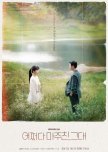
Sophisticated genre mix. Soulful. Well grounded. At a comfortable pace.
With "My Perfect Stranger" KBS has succeeded in creating a sophisticated genre mix: there is a complex crime thriller that is excitingly intertwined across time and space, colored with its ultimately opaque interdependencies. There is charming time-travel with the chance to heal emotionally troubled family relationships and with the distinctive complexion of the late 1980s in the transition from dictatorship to democracy. There is also the pointed coming-of-age of the protagonist's parents and their classmates of that time. At last, even a (though rather tender, cautious) love story emerges out of the common fate of the two time travelers.The KDrama thus is presenting (in my opinion) a thorough emotional variety, which has a lot to offer from suspense to amusement an even romantic vibes. So all of this comes rather casually. Well grounded. At a comfortable pace. With feeling, especially around the diverse family dynamics, which are allowed to take their distinct twists and turns from the different perspectives of time and space.
A coherent, harmonious KDrama experience. Worthwhile.
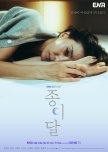
More than a remake. Delicate timbre. Powerful. Reckoning with the void of a luxury-branded world
"Pale Moon" develops a particularly delicate timbre. Fine personality portraits, none of them smooth and pore-deep clean, but rather inwardly crumpled people with dreams and weaknesses, people who sometimes make questionable decisions, who don't stick to the rules, who succumb to the temptation to take the chance to realize their dreams.A little 'noir' here and there. In any case, emotionally dense. Unexcitedly emotional. Quiet and yet powerful.
The KDrama is based on a Japanese Original (Mitsuyo Kakuta), which was successful as a series and movie, too. This is now a South Korean remake. Apparently, Kim Seo-hyung was immediately (after she saw the original in 2015) determined to play the female lead in any potential South Korean remake. You can tell, she is breathing her role.
The original novel is about the embezzlement of bank funds as actually happened in Japan. In South Korea, the list of embezzlement in billions is also long and the remake is accordingly well placed.
However, the South Korean remake is about more than misappropriation of wealth on a large scale. This is generally about lies, deceit and deception - even on a smaller, manageable, interpersonal level. However, it is also about human vulnerability, the cracks in the facade.
The story unfolds against the background of unstoppable consumption - a veritable frenzy of consumption that has long since left any connection or grounding behind. A life-style in a parallel world, that only a few can really afford. This world of luxury, which initially seems appealing, develops an intoxicating, addictive character and ultimately catapults itself into the void. What remains when the lover equips the lover with the designer goods from head to toe, from the car to the house including the interior and the laptop, too? Alert, alert: the luxurious world of matter - initially well camouflaged as the lifestyle of your dreams - becomes an ugly parasite that feeds on substantial emotions, liveliness and passion, but in the end leaves nothing behind...
In the field of tension between the dreary normality of a boring everyday life that is perhaps pimped out on the outside, but emotionally rather empty, almost everyone here is willing to deviate from the path of virtue in order to get a piece of the promisingly dazzling consumer cake.
Nevertheless, the story also tells of the sincere moments of perception and recognition of unsightly vulnerability. These are the moments when sincere encounter happens to become possible. On the outside, these are not the nice, shiny TaDa moments, but on the inside they provide light and warmth, they nourish the soul, like water making flowers bloom. Moments that cannot be bought with money. Moments that are among the most worthless in the dazzling world of consumption, shunned, despised, marginalized, excluded.
In this way, "Paper Moon" is an intelligent approach of reckoning with the consumer-driven social reality in which 'appearance' takes the place of 'being'. Quietly and constantly the KDrama is reminiscent of the basic in human, which has nothing to do with staged perfection, but rather with irrational impulses and irreconcilable paradox. At most, beauty in ´being human´ unfolds when weaknesses become strengths, when ruptures make the whole, when betrayal opens the door to freedom, when loss becomes the gate to abundance, when I find myself by losing myself, etc.
Since we are all human, we can remember (that we are like that too) and empathize and accept ourselves (and others!) even in our (their) 'ugliness', 'despair' and 'failure'. That makes life truly valuable and remains as a valuable experience, even if any material value has long since disappeared.
------------------------------------------------------------------------------------------------------
SIDE NOTE: -------- 'Paper Moon' vs. 'Pale Moon' ----------
The original title "Paper Moon" was for the international title particularly changed from "Paper Moon" to "Pale Moon" in order to create a certain degree of selectivity from the Japanese original. The story may be remade, but it's retold in characteristic korean-style. Successfully so. And if you like, the changed nuance in the title already testifies to a finely nuanced, additional facet within the KDrama production.
The term "PAPER MOON" refers to a fake, oversized crescent made of cardboard, which became fashionable at the time, with the advent of photography, as a specific variant of (cheap but effective) portrait background. At fairs, etc., photographers as a special gag offered the cheerful visitors unforgettable portrait photography in front of an artificial crescent moon made of cardboard. The happy couples (but also everyone else who had their picture taken) floated optically above the clouds, removed from everyday life, yet oh so close to the (artificially fake) sky... A reMINDer, documenting a very special moment.
Since then, the meaning of the ´paper moon´ generally refers to an object with the help of which a void is filled with fictitious, purely optically reality – a make believe. However, the emptiness is still there. The symbol, enriched with meaning, inspired many a great work. One of them is the piece of music "It's only a Paper Moon" (originally "If you believed in me"), which summarizes the basic idea or the basic feeling in a striking way - as a tightrope walk between hope and hopelessness...
"Say, it's only a paper moon
Sailing over a cardboard sea
But it wouldn't be make-believe
If you believed in me
Yes, it's only a canvas sky
Hanging over a muslin tree
But it wouldn't be make-believe
If you believed in me
Without your love
It's a honky tonk parade
Without your love
It's a melody played in a penny arcade
It's a Barnum and Bailey world (=circus attraction)
Just as phony as it can be
But it wouldn't be make-believe
If you believe in me"
...The unreal reality, the deception, the lie, all of this could be true if only one can convince the others that it is so.
"PALE MOON" on the other hand refers more to the real, pale (full) moon in the night sky, which is repeatedly staged in this KDrama. It's not dazzling like the radiant, all-illuminating, blinding sun, and not loud and spectacular like fireworks, (and not as big and dominant next to me as a paper crescent moon). The pale (full) moon only shimmers in the dark hours of the day. It may light the way and also cast shadows, yet from my perspective it is just tiny and far away.
Nevertheless, despite appearing almost fragile and delicate, is solidly stands there like a vague, quiet, soothing reminder of something truly beautiful and valuable. Something that is there repeatedly, with beautiful regularity - remaining, just being, no matter what. Something to relate to. Far away it may be, yet emotionally quite substantial - and thus close to the HEART.

An all round ambitious work. (However, 'beautiful' is different...)
"Three Sisters" has won numerous international awards. 12 to be precise. But I'll say it right away: it's overall rather painful to look at. It's even painful to the point. Again and again. So true-to-life that it even hurts some more. Some might seem crass being focused that intensely. But at the same time it's not that crass, actually. It is the normality shining through behind the story, that is almost the most painful part of this KMovie.Three sisters, each in their unique way coping and trying to live with the pain that forces their souls into a corset from which they don't know how to free themselves. They live with their trauma. Are alone, captured within their traumatic past. They don't talk about their trauma. They are emotionally rather surviving than actually feeling alive. They are still trapped in their unresolved past today, because they don't recognize or acknowledge the corset as such. But as long as that doesn't happen, they can't put it off and thus learn to approach life, experience life without a corset...
Haunting portraits of women! So intense that the pain reaches the audience, as vicarious emotion so to speak. Fantastic actresses. An excellent KMovie in all aspects... lighting, scene, shot, cut, etc. too... An all round ambitious work. (However, 'beautiful' is different...) About a topic that is one worldwide. About a topic that is also a big one in South Korea with such a strong patriarchic family hierarchy. A trauma that far too many people on this earth learn to endure. Have to cope with one way or another. Suffer from for the rest of their lives. Being ashamed of it. Yet, actually rather being ashamed of themselves. Because they can't explain the incomprehensible in any other way. Thus they remain trapped in the ineffable.
No movie for every mood.
Yet, when the time is right, then definitely worth it.
------------------------------------------
Spoiler alert:
Here the unspeakable is spoken out at last. There is an unexpected showdown that has it all. Something that is liberating. Yes, it hurts, again – just like cold fingers starting to feel the warmth… True enough, healing is a process. (Life hardly becomes smooth&easy overnight.)
Acknowledging the corset. That is the first step. Feeling it, joggling it. This is the next step. Then get on the trail of your own feelings. Find some expression for it. Surrender to your vita and what you sur-vived so far. Let go of the corset, by now being grown and old enough to stand by your side. Grab your inner child´s hand and allow yourself to be who you are, embracing the feelings you have. All of them. The anger, helplessness and desperation, too. Be proud of who you are. Daring, step ahead. Longing to be. Being free to be. Being palpable. Being. Sharing. Communicating... giving life a second chance...
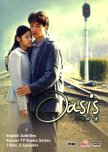
Close to the protagonists - format may be 'old', but script is round, coherent and flawless
I stumbled across "Oasis (2003)" or "Desert Spring" in the context of "Oasis" from 2023. I was curious if there were any parallels (besides the title). There are. Whether they are random or not, I don't know though. The 1940s/50s (in "Desert Spring"), like the 1980s/90s (in "Oasis"), are neuralgic phases of liberation from oppression in recent Korean history. HERE the last years of the Japanese colonial era and the Korean struggle for independence as well as the time under the occupying powers (e.g. USA) form the framework of the story, THERE the time of the dictatorship in the face of an increasing democracy movement. HERE it is radio, music and broadcasting, THERE film and cinema, that open up space for hope, visions, resistance and dreams. Here as there is a rival (who is HERE written more three dimensional than THERE) who refuses to see that the heart of his beloved already belongs to someone else. In both cases, the rival is on the side of power. In both cases the male protagonist is a talented but penniless young man who is in danger of getting underneath the wheels of the influential. Here as there, the female protagonist is a patent woman who knows what she wants.Apart from that, however, many things are different. In particular, the narrative style in "Desert Spring" is a lot more poetic, more visually impressive and with the camera emotionally closer to the protagonists than in "Oasis". Style and format may be 'old', but the script is round, coherent and flawless. HERE (more than THERE) the feelings (and struggles) of the two leads for each other take up most of the space. Almost the entire first episode tells the budding relationship between the two leads in impressive, emotional scenes with plenty of ambience of that time. The time from childhood to adulthood is sensitively sketched without many words. The sequencing and entanglement of events is suggested rather than worked out. However, the story is always close to the two young people who gradually come closer to each other over the years through a chain of coincidences. HERE the way to go is the goal. This was always against the background of Japanese colonial rule, the Korean followers on the one hand and the underground struggle for independence on the other. Music and radio form the context in which the two protagonists develop, prove themselves and finally meet and commit to each other as man and woman. But they don't live in a vacuum. For various reasons, Gi-hyun is a thorn in the eyes of the pro-Japanese collar & tie-wearers from the executive floor. Suddenly, Gi-hyun is on a red list. And even the end of colonial rule does not erase the past.
The KDrama only has three episodes, but they pack a punch. The third actually comes as a double pack with two hours. Impressively told, the story definitely leaves its mark. Even if the leads may not be so familiar to Western audience (compared to superstars from the newer KDrama productions), at least Song Il-gook has cult status in his own country, since "Jumong" at the latest.
A KDrama that uses creative means to reappraise a piece of bitter history in passing while telling a touching love story.
I stumbled across "Desert Spring" almost entirely by accident. Thanks to "Oasis" (2023) I found "Oasis" (2003). At this point, my sincere thanks go to the KDrama "Oasis" (from 2023), because without this reference to the namesake, the more than 20-year-old 'precursor' would certainly not have fallen at my feet.
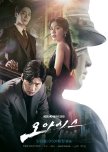
ambivalence
"Oasis". Hm. I've thought whether I should continue watching or drop the series... I've also considered more than once whether I want to write something about it... My feelings about this KDrama are ambivalent. However, the ´why is this?´ , is why I actually consider it worth mentioning.Sure, there were bumpy details, like the boys' artificial skin tanning when they were young, but I don't want to dwell on those.
>> The decisive factor for me, not rooting so much for this show, was and is that I really do NOT care so much for ANYBODY in this story. I understand, yes. There is empathy, yes. But sympathy? I couldn't care less. I've never had that before. I actually didn’t care. Neither the love story, nor the incorrigible rival, nor the girl wanting to bring back her father's cinema – this all and more only had limited impact on me. That's why I was tempted to turn my back on the story. Yet, I don't want to deny the actors' ability. I would do them injustice. They did their job fairly well. There are a number of strong moments. But still, maybe they were not the perfect cast? In any case, I would argue that in “OASIS” the character portraits were simply NOT drawn that well. ...In my view, that's obviously NOT the strength of the script...
Then there is the historical context of the series – the rollercoaster ride of the 80's and 90's. In South Korea, they are the neuralgic interface between dictatorship and democracy. But I don't want to dwell on this either.
>> What was decisive for me was that the STORY of the KDrama really mattered to me – whatever triggered the dynamics, the twists and turns. Intertwined with it were indeed countless moments that touched me deeply. Starting with the seed that underlies the whole drama: the fatal loyalty of the former slave not only to his deceased master, who had fought for independence, but also to his son, whom he now still serves as a free man. And then also the fruits that came out of this seed. Plus a lot more. The circumstances, the constraints, the social context that shines through in how it shapes (or had shaped) people, all of this really had me .
The way these forces of time and history run along in the background as a matter of course and keep stirring up the lives of the protagonists at crucial points, I think the script did THAT quite well. (However, I don't know whether it would have worked that way if I hadn't already known something about the political and social context back then.)
Maybe I could summarize: The portrait of how the historical dynamics are intertwined with personal destinies is well done in "Oasis". The character portrait of the comparatively stale protagonists, on the other hand, is less so. This discrepancy, resulting in my rather indifferent experience of the main characters on the one hand, and the emotional force with which the story keeps lashing out on the other hand, is a phenomenon that I have never experienced in a KDrama before. (But I don't necessarily assume that this has to be the same for others as it is for me.)
Eventually, despite the ambivalence, I watched to the end and was always curious to see what would be next. I can't say I regret watching either. But then I wasn´t all that happy in the end - even though I was partially impressed by the showdown, (yet, again, only partially.)
----------------------- Tiny side note: -------------------------------------
Re: 80's and 90's:
In connection with e.g. the KDramas "Sandglass" and "Giant" I have already given some of the political coulors of the 1980s and 1990s. Much of this applies to the historical context of "Oasis" as well. (you might want to check there.) Here, though, the dubious role of the secret service comes more into focus.
Re. Movie theatre:
The dictatorship was characterized by censorship. In addition, there was no freedom to travel. Accordingly, the cinema was like a window to the rest of the world, and generally offered a canvas to dream away from one's own misery, at least for a while. That may be more or less true wherever you look on this planet. But in South Korea at that time certainly more than i.e. in Europe. The role of the ´cinema´ in "Oasis" not only coincidentally represents liberation (struggle - especially of the female protagonist).
---------------------------------------------------------------------------------
Ps.:
Because of this KDrama I stumbled over another one - same title, 20 years older: "Oasis (2003) " or "Desert Spring".
I am grateful for this discovery thanks to the name-connection. Actually I liked that older one (despite the specific doing of that time) even more...
Nevertheless I consider "Oasis" (2023) having its moments, too...
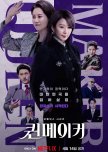
Sisterhood in a man´s world. Let yourself get both annoyed & inspired by politics behind the scenes
What a wonderful power show inside out politics. Yes, it's ugly and you might want to smash right into it. Often enough and plentifully. But it also has its heart in the right place. Repeatedly. Dealing with politics may make you doubt the meaning and purpose of democracy. But it doesn't get any better without those intrepid heroes willing to stand up for a better world. One may sometimes lose faith in something like a democratic gene in people. But one can always hope and fear. The game is only over when it is over. The election is not over until the votes have all been counted.Stupendous women. On both sides of the front. And the men? Oh well. So and so. (And if many people complain about Lee Geung-young because of his scandal, he at least prefers to choose the role of the challenging guy, where one can wholeheartedly consider him disgusting...)
Well, I consider the sisterhood thing being the crucial message for me in this story. Yes, there are strong, competent women, who, against better female instincts, cling to old structures and customs - in the wake of the Jaebeol clan. Yet there are those competent, motivated, witty, loyal to higher ideals women, too, who are sharing those ideals with others and walking side by side. Even if tempted and seduced they still sense what is right and wrong and act on that when in doubt. Using and abusing (interchangeable lackeys) for personal gain vs. appreciation and recognition (of brothers and sisters) are very sensitively compared here as common HR strategies and management styles.
With 11 episodes (only), Netflix slips through the story fairly quickly - only the most necessary input about the protagonists are given. However, especially the actresses don't let the story rush past you. Kudos to (in this case in particular) the heart and soul of the Ahjummas and a storytelling that, while strikingly handling the political landscape for its stringency, nevertheless spreads the complex mixture of motives, hopes and fears in a well-sorted manner.
Does the end justify the means? This age-old question apparently never ages. "Queenmaker" makes you think, but also often leaves you terribly annoyed about the way things are. The KDrama makes you angry, demoralizes, and yet: at the same time it gives hope. Strong women, a strong story, an often enough an ugly world in which, however, once again each individual contributes to the fact that it could be one way or another...
Obviously I would recommend it - if you´re in the mood for something like that. And: obviously there are no Idols and no Love Story involved. People may die, but it is no crime story. It isn´t funny, either. Nevertheless, I would say, you should check it out and let yourself get both annoyed and inspired by politics behind the scenes.
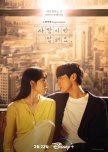
An uncommonly, almost tenderly told revenge story
"Call it Love" begins with a quote from a writer about love, followed by a voiceover radio announcer's summary: "To understand the loneliness of others, for me, that's the beginning of love." Beautiful, sensitive words... and at the same time: the grounding of this KDrama.There are so many lonely people out there (even if that doesn't necessarily mean they're alone). There are also those who recognize the other in their loneliness. Love in different facets swings back and forth between each episode - quietly, tenderly, unspoken, then also outspoken, sometimes here, sometimes there. In the case of Shim Woo-joo and Han Dong-jin, despite barriers love like determined water finds its way.
The KDrama offers no ´boom-squish´, no spectacle, yet slow food for the heart. So slow, that it almost touches the edge of the bearable at times. Watching the two protagonists moving through scenes is almost like in slow motion. The facial features are minimal, too. However, it´s nevertheless expressive and intense. Tender emotions are held back, an the next moment some razor-sharp thoughts are communicated without hesitation – Woo-joo is good at that. She embodies a sharp mix of disinterest and impulsiveness. Dong-jin, for his part, is the master of outward indifference and equanimity, enduring life´s challenges quietly and good-naturedly – almost stoically. But both are basically victims of their learned helplessness and of being overwhelmed with their extremely ambivalent feelings towards their own parents. ´She´ is still bitter because of her cheating father, who left the family for another woman. His burden is his exalted mother, who notoriously charms other people's husbands and lives a ´good life´ at their expense, with her son being in the way and left with the father.
A web of loving people are surrounding both Woo-joo and Dong-jin. So, even if they may feel alone with their feelings, they really aren't. Woo-joo's friend, the pharmacist Yoon-jun, feels a lot more for Woo-joo. Dong-jin's school friend and business partner knows his buddy like the back of his hand. Then there's Woo-joo's sister, who for her part is struggling with dating and finally just discovers her feelings for Yoon-jun. And suddenly Dong-jin's ex-fiancé is back, who left him without a word a year ago, went to the USA and is now suddenly back, being ready for the next step. ... Somehow everyone seems a bit lost and sometimes awkward in their emotional life, as well as in their (traditional) family liabilities. They might feel lonely. But they are actually not alone.
Technically speaking, the plot aims for something completely different than romantic love: revenge is the driving force of the story. There's Woo-joo on her vendetta against the woman who stole her father and secured the house as an inheritance – with the vendetta actually targeting the son, Dong-jin. Then there is Dong-jin's former boss, who wants revenge for Dong-jin resigning along with his childhood friend from school to start a rival business. And there's the age-old dynamic between Woo-joo's mother and her rival who stole her husband years ago...
Somehow like balm: here the revenge motive can't prevail in the end. Rather, a gentle template of compassion and forgiveness settles over resentment and bitterness. Like a silk scarf, this compassion covers the wounds and thus changes, rather widens, the perspective. "To understand the loneliness of others, for me that is the beginning of love." In the end the truth of these words is revolving about much more than 'just' romantic love – the heart empathically banging on another one´s wall, makes the wall come down and healing become possible.
Gaze, movement as well as camera angles are chosen with care. Like that more than once time is frozen, sort of. Often enough, this KDrama is deliberately so slow that you might want to give the protagonists a nudge here and there. Paradoxically, this perceived standstill envelops the actually quite dynamic story, which gains its drive from the revenge motive and knows very well how to come up with tension, too. This idiosyncratic mixture of dramatic events and moments of standstill, of revenge and honest love, results in a very unique, ambivalent, subtly burned-in dynamic and elusive fascination for this KDrama. Cupid interjects encouragingly and does it well. Actors and actresses also successfully correspond with authentic emotion.
Ultimately, an uncommonly, almost tenderly told revenge story.
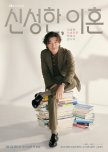
The story being told in an unagitated & well-rounded way unfolds its unique (I´d say: high) quality
"Divorce Attorney Shin" is actually based on the webtoon of the same name by Kang Tae-kyung. The KDrama comes with the handwriting of the same screenwriter as i.e. "Thirty Nine", "Always" and "Encounter" – Yoo Young-ah. In the case of "Divorce Attorney Shin" once again shows off her strengths: drawing true-to-life, sensitive portraits of friendship and relationship dynamics with plenty of ordinary life of ordinary people. In "Divorce Attorney Shin" you get (also thanks to marvelous actors/actresses!!) authentic, lifelike characters and circumstances. In this case with sometimes maybe a bit weird, but loving details. With characterful esprit. Unagitated. At times a joy to the heart. Almost soul food."Divorce Attorney Shin" tells stories from the red-hot everyday life of many people in South Korea, which is increasingly about divorce. The number of divorces in the country is currently going through the roof. The topic becomes almost normal madness. KDrama understands this just as such. Divorce is normal. Not nice. Not desirable. Not originally intended. But often unavoidable as the next step. And sometimes maybe...
(A bit tongue-in-cheek: the title. Attorney Shin's name "Shin Seong-han" literally means "sacred" in Korean. Thus, his name tag "Shin Seong-han, Divorce" becomes a provocative play on words. Attorney Shin is also the man for the cases when the ´holy state of marriage´ has faltered...)
There are many reasons and circumstances behind such a momentous decision as divorce ( ... and it may always accompanied by a bit of shame and feeling of failure, which needs to be digested emotionally). Some of them come along enrobed in different cases. They are weaving their way around the frame of the story, the main focus of which are three old friends – above all, however, divorce lawyer Shin Sung-han. One of the recurring scenes is the small but finely drawn retro lawyer's office with a wooden sliding door that sometimes gets stuck, which you quickly grow fond of. Also, Shin's apartment with retro-style hi-fi, where he spends his evenings listening to loud Trot music, preferably singing and drinking soju from a wine glass. And then the cozy Ramyeon restaurant around the corner from the office. Added to this is the special relationship between Shin and a client who ultimately joins the team and another young lawyer, who somehow stumbles over Shins piano skills into the office. And then there's his own past as a gifted pianist and the reason why he's no longer one.
Kudos to the layered nuances that paint the complex environment in which divorce tends to be embedded. No divorce is like the other. But most of the time, divorce hurts or hurt started before and therefore led to it. "Divorce Attorney Shin" touches on a multifaceted assortment of backgrounds and triggers over the course of 12 episodes short-term critical circumstances and long-term effects, emotional suffering and opportunities, economic chains and hopes, social stigmas and societal prejudices, and then, too, self-doubt, as well as collateral damage and sacrifice. It's not always just 'the others' who are affected, but the controversial issue of divorce is getting very close to almost all of the protagonists. JTBC attacks a hot social topic with the KDrama.
"Divorce Attorney Shin" offers all this embedded in a variation of slice-of-life. Leisurely, cozy and enjoyable – and therefore digestible. But it's not at all harmless. There is plenty of law-and-order with a comprehensive arc of suspense. On the one hand, this is the professional talent of our protagonist – although not his only one. On the other hand, there is his own family history, marked by the pain of separation and divorce, which is unexpectedly stimulated anew. The dramaturgical dynamic of the story is increasingly gaining momentum and ultimately steers inevitably towards Shin's very personal showdown, where justice is fought – not with firearms or fists, but according to the law, with evidence and with a sense of proportion, heart and mind.
In my opinion, the story finds an extremely fine nuance on all levels, which shows an ever deeper effect over time. Subtle but lasting. I would associate (not timbal, but) Koshi chimes – depending on topic and episode, sometimes more in the timbre of Aqua, sometimes more in the timbre of Aria, sometimes more in the timbre of Ignis, and sometimes more in the timbre of Terra... The story being told in a coherent and well-rounded way unfolds its very unique (I´d say: high) quality.
-----------------------------------------------------------------------------------
SIDE NOTE: --- Trot ---
KPop is a 2000ff phenomenon in Korean music history and by now even most non-KDrama fans are familiar with it. ´Trot´ however probably is less known. But beware: maybe in the not too distant future there will also be a KTrot, who knows...
'Trot' dominated the Korean music scene – as the earliest form of popular music in the peninsula. Trot is less well known to the rest of the world, but has experienced an enormous revival in its own country in recent years, which is now taking the genre even beyond national borders, too. "Divorce Attorney Shin" presents one of the hits, which was released brand new in 2020 on the CD "9 Stories" by Trot old master Na Hoon-a. The 72-year-old landed a megahit, with its YouTube video being viewed 25 million times and thus temporarily relegating the superstars BTS and Blackprint to their places. Korean cultural export strategists are smart and quick. The song promptly finds its well-staged place in the appropriate KDrama with "Divorce Attorney Shin", which also takes the direct route to the international audience via the Netflix streaming platform…
'Trot' grew on Korean soil and is quite retro in its foxtrot and slowtrot beat derived from standard dance. 'Trot' goes back to the time during the Japanese colonial period and the import of the 'enka', mixed at that time with the folksy, epic pansori lamentations (at least for me often reminiscent of flamenco), as well as the traditional aesthetically harmonious, lyric poem form Siga. However, due to its entangled roots with the Japanese 'enka', 'Trot' fell under censorship from the 1960s onward and only resurfaced in the 1980s. However there was also J-pop , hip hop and rap allowed to reach the masses and with that influence the then upcoming new and hip KPop pushed 'Trot' into the background.
Only now, when KPop is firmly established, does interest and space for something 'new', identity-establishing traditional obviously open up again. There may be something old-fashioned about ´Trot´, since young people are more familiar with it via their grandparents generation. However, the music triggers a nationally rooted, melodramatic emotionality... It's quite possible that a contemporary, new variation of internationally hip KTrot will develop over the course of the next few years. At least the trot is rediscovered – not first – but also by "Divorce Attorney Shin"...
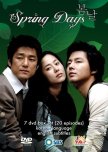
There are times, I think, when nothing beats a KDrama from the early 2000s
"Spring Day" is a love story told in a triangle. So drama in drama feels right at home here. And "Spring Day" has a lot more to offer in the proven makjang-mix to really heat up the story. If the merry-go-round isn't going straight forward, than simply because it's going backwards.Three is one too many. Being well aware of the consequences and where the story must lead towards, it is nevertheless the path that paves the series pleasure of cathartic ups and downs. You can get really upset about this and that. The rhythms of the soundtrack whip your emotions through the most varied of situations. The assorted mix of (by now long) proven actors give the protagonists their three dimensional profile. None of those characters is really grippy, smooth or edgeless, though. Whether brotherly relationship, romance or parental relationship, it´s all full of sometimes touching, sometimes pathetic ambivalences – sometimes hurting, sometimes soothing and hurting at the same time. In short, the KDrama presents quite some space for compassion and catharsis.
There are times, I think, when nothing beats a KDrama from the early 2000s. I couldn't have timed my ´Spring Day´ better (in Spring 2023). After a flood of stories about contemporary scheming, autocratic backroom politics, bullying among students and misogyny, "Spring Day" feels like an island in many ways. The world is not safe there, on the contrary. Makjang rocks the turbulence upwards. Nevertheless, there are 'only' personal destinies and family tragedies here that do not have the social impact of some current series topics. We get thrown around in an ambivalent emotional swell between 'soothing' and 'hurting'. In the end the story is told to the end. The ending may or may not please, but it has its ending. (A lot of recent KDrama with current underlying social issues tend to deep down leave a thorn after the end of the story, as the social swamp that fueled the story remains a given reality and lingers on…)
------------------------------------------------------------------------
By the way:
With "Spring Day" in 2005, Go Hyun-jung marks her comeback after a War-of-Roses divorce with a Jaebeol of the Samsung Dynasty. So in 2003 she actually had just finished her own Makjang drama personally. Eventually, she was able to free herself from the obviously tormenting clutches of her husband and his dominant, oppressive family, who (so it is said) permanently devalued her because of her humble origins, simply making use of her beauty for bearing pretty children. Yet the price for liberation was high. Above all, she had to leave her children behind and give up visitation and custody rights. Although she was able to re-establish her life somehow against all (by her husband´s family deliberately implemented) odds , she (so it is said) still is not allowed to see her children to this day.
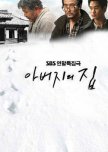
What an outstanding chamber play with two extremely gifted, stellar actors
Father's House" has two episodes only.What an outstanding chamber play, though!
With two extremely gifted, stellar actors. Choi Min-soo, already living acting legend at that time, and Kim So-hyun, then just in the starting blocks for fame. Choi Min-soo and Kim So-hyun deliver an unforgettably intense, mature performance and thus the authentically touching portrait of a dear, profound, yet often clumsy father-son relationship over a period of more than 2 centuries.
Male feelings are the focus. The heroes in "Father's House" are men of simple, humble origin - with either a gruff, rough and rumbling or withdrawn demeanor of hidden feelings that are rather reluctant and probably seldom felt, let alone shown. However, having feelings and showing emotions is allowed in this KDrama. It's difficult to deal with, yes, but it's possible. Necessary even.
Emotional sincerity has a liberating effect. The three male protagonists - son, father (and his adopted father) - actually become role models. "Father's House" came as a distinct year-end television show at the turn of the year 2009 - with reruns after that...
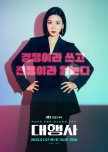
Women on the ball. Delighting, enraging, inspiring, concerning. Excellent script. High-end KDrama.
"Agency" has it all. Viewership has skyrocketed, as have ratings. "Agency" is the hit. Cool freshness, fashion, speed, one or the other rivalry as well as all categories of human manners, even the lowest, underline the handpicked lifestyle ambience. This all guarantees a lot of fun, seriously...The topic hits the South Korean nerve of the time. The nerve of women in particular, I should add. What may appear to Western eyes as an entertaining office drama with catfights has a completely different explosiveness in the eyes of Asian, especially South Korean viewers: The deeply hidden, rousing topic of the time, which affects everyone, is ´population decline´. The critical nerve bubbling on the surface revolves around ´sexism´ and ´misogyny´. The incumbent President Yoon proclaimed that these topics could be shut into history books, but "Agency" gives him the lie, right on. The KDrama clearly demonstrates how up-to-date it is. More than one South Korean woman in this story, no matter what position – down to the generation of the mothers of those mothers in the series - will find themselves here. And more than one man as well...
It is pleasing to see how razor-sharp and competent the female protagonist proves herself in this man's world. Also pleasantly refreshing side effect here and there: alternative model approaches for female vs. male management styles. And then there is the extravagantly privileged and insolent Jaebeol of the youngest generation who eventually is inspired to break free from her heavy chains of family-clan expectations. Besides their punching power, both lead ladies are palpable, too. Watching the series is a pleasure, even if the topics touched on may also arouse rather different feelings as well... A colorful bouquet of thematically critical, plot-relevant threads is dramaturgically subtly intertwined. In addition to the two female leads, there are also diverting (women´s lib) moving stories about Go Ah-in's employees and colleagues.
Stellar, good-humoured actors. Excellent script. A wonderfully balanced mixture of fun and seriousness, of pace and depth. The coherent details were undeterred on a differentiated, complex overall picture of the current business world. High-end KDrama-'pleasure' – delighting, enraging, inspiring and concerning. And while we are at it, "Agency" is innocently, smilingly, prettily and yet cleverly and valiantly placing a feminism-sting, too.
---------------------------------------------
SIDE NOTE: --- Misogyny and population decline in South Korean society ---
Without women it won´t do. But South Korean President Yoon has now officially messed with them. There was an enormous wave of protests when he announced that he wanted to abolish the ministry, which had been set up around 20 years ago to support women against sexual assaults and for equal rights, arguing the issue was no longer an issue. Immediately, around 800 organizations formed and stood up. President Yoon, who is promoted and sponsored by a strong conservative, patriarchal current, has blown a hornet's nest. His world – that of macho men – is obviously different from that of contemporary South Korean women.
It is a given fact, that misogyny in South Korea characterizes everyday life throughout all classes. Neither an entrenched, male-dominated business world from the bottom up to the boardrooms, nor professional disadvantage and discrimination of women in the workplace, belong to history yet. In the contrary, recently it has even been fuelled by the election of the current President Yoon. Fortunately, there are opposing movements and criticism. The KDrama "Agency" uses a socially critical magnifying glass here. Nevertheless, there is still a long way to go, although a drastic reflection is desperately needed, in order to be redirect economic development towards a positive light.
The current demographic trend is closely linked to the economic and social situation, which is shaped by antiquated patriarchal beliefs. Those old (apparently always happy to be taken off the socio-cultural shelf, dusted off, polished to a high gloss and then put back again) convictions stand in stark contradiction to the high pace of the high-tech modernity of everyday life in South Korea. This tense paradox is already having a negative impact (not just on women's attitudes towards life, but also) on the country´s economy. The official statistics on population development from August 2022 show declining numbers for the first time. Actually, the country's birth rate is the lowest in the world. There is no trend reversal in sight. The population will continue to shrink. And that is already and will even more so affect the economy. The proportion of women in the working population (at 55.1 percent) could certainly be increased. Although South Korean women are very well educated on average, only a little more than half of them actually bring their skills into business life. Among men, on the other hand, 73.7 percent are employed. This is due not least to the misogynist attitude in all areas. The difference in pay between women and men is estimated at 31.1 percent. Nowhere else in the 38 OECD countries is it THAT bad. Added to this is the disadvantage on the career path. Work-life balance is in its infancy, because the motto is: woman to the stove. Executive suites are for men only. Women are rarely seen here. And if so, then often only for ornament or to fill the image of an empty marketing shell (similar to "Agency").
It's high time that the many misogynists among South Korean men (including their president) arrived in the present. In the long run, a trend reversal can only succeed jointly – at eye level.
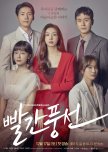
about the ´art´ of becoming an egoist
You may consider "Red Balloon" being one of those family makjang stories that come up again and again in different versions in KDrama-land. Tangled ties of fate and trauma that continue to get even more tangled and traumatizing. You might think “Yeah. Makjang again. Family drama again. Forbidden love again. Ok, you´ve seen it all. You don´t need another one.” So should you watch? You definitely don´t have to. But oddly enough: you may want to. The characters, with all their sometimes almost disturbing ambivalence, drag and pull you under their spell. Subtly, unperturbed, whether we're watching or not: they are struggling to function and survive within their dysfunctional relationships and families... and on top of it: they are even longing for far more than that.2022/23 "Red Balloon" infiltrates South Korean homes as the red-hot contemporary document of a complicated ordeal, which society increasingly has to deal with. On the one hand, family is regarded as the highest value in society. On the other hand, within the last decades national divorce rate has reached the tops in worldwide comparison. Yet, divorce is still seen as a shame – a topic for ´other´ families only (if at all). Nevertheless, more and more South Koreans are choosing this path, even the 'elderly' (those over 60 and even over 70) are increasingly opting for divorce. The KDrama juxtaposes the hardened socio-cultural fronts within a fictional story that listens to both sides equally, gives space, allows themselves to be rubbed against each other – sometimes loudly, sometimes violently – and struggles to find solutions.
Throughout the KDrama, events and emotional ordeals continue to get worse. Seasoned with gradually increasing makjang tension, with complex personality portraits, as well as poignant, excellent pleas (sometimes for one, sometimes for the other and sometimes for yet another position), the KDrama screws itself deeper and deeper into the increasingly heated minds of the audience. "Red Balloon" succeeds excellently in taking its often head-shaking viewers into truly impassable, controversial socio-cultural terrain and, with the concentrated confrontational dramaturgical charge of emotional ambivalence, exemplifies what would be, could be, yet must not be, however wants to be possible, (and after all IS possible in South Korea 2022/23).
There are multiple storylines that are heartily intertwined. But they all deal with the same topic: the critical fine line between a so called ´satisfied´ life (as one normally lives / should / has to live / pretends to live) and a self-abnegating, self-deceiving ´dissatisfied´ life; the latter mostly going unnoticed, though, because actually everyone lives that way and it seems to be the most natural thing in the world... Dissatisfaction only becomes critical, if someone can no longer ignore that this supposedly ´satisfied´ life is actually a 'dissatisfied' one. The subtle psychological tension of the KDrama emerges in the conflict between traditionally unquestioned, accepted customs and the individual urge for deviation, which (here) rages more or less intensely in almost all of the protagonists, and erupts in an attempt to break free. Daring to dream, being honest with oneself and eventually even making the necessary efforts... but, alas, also being sincere in respect to the social environment? Ready to disappointing the expectations of others? Prepared to missing duties and responsibilities? To hurting loved ones, too? Has actually anyone ever honestly tried to truly walk along his/her individual path sincerely upright? (At least when it comes to South Korea 2022/23, so far there are hardly if any role models whatsoever.)
"Red Balloon" can be considered a social study using the example of the microcosm of three families, that are connected, among others, through a (not quite balanced) childhood friendship between two female protagonists. Yes, one could bitch and nag about prevalent adultery among the protagonists. On the other hand, in this case I´d like to set a different focus, that is: Collectivism in conflict with increasingly burgeoning individualism. Against this background, it is more about the 'art' of becoming an egoist. (See side note below). In a society shaped by collectivism, social class and hierarchy like South Korea, 'egoism' (=standing up for individual needs, even in the face of social pressure) has so far not been a quality in itself. On the contrary. The development of such an independent and socially recognized value is in its infancy there. The protagonists are correspondingly insecure and sometimes stumble, doubt themselves, look for a turnaround and reflect on the old values... which include: doing what other, older, financially better off fellow human beings say, want, demand. (And thus, often enough being humiliated, too. A life full of sacrifice, humiliation and shame is quite normal. Most people live that way. Accordingly there is nothing wrong with it, right?)
Shameless adultery might be one side of the medal. The other side, however, represents the widespread, customary long ignored individual dissatisfaction for the sake of ´the group´ (family etc.) that some can no longer cope with. The KDrama team draws memorable portraits of people at different ages, who have their quirks like anybody else. At some point, they try to stumble free from the expectations of others and rather follow their gut. They want to, and choose to live up to their own desires... struggling, staggering, falling in the face of the mercilessly blowing headwind. There might be an urge to break free of a tight corset of expectations and obligations – yet, just daring to think in this direction is considered shameless and despicable... Sympathy for family struggles, sacrifices, deprivation and suffering, on the other hand, is widespread, because this individual pain results out of self-sacrifice for the 'group' and in this case is downright virtuous. (The KDrama Orbit has told countless stories of this virtue since the earliest productions.) Sympathy for 'individual' pain however, e.g. suffering from the group pressures and demands, is hard to find. With a newly found egoism and its associated pains one is left alone... Well, has been, so far. Not anymore. This is where "Red Balloon" comes in… at least with an example of role models on fictional playground.
With its tricky, controversial topic, the KDrama hits the mark of many minds in the country. The audience of "Red Balloon" had quickly doubled and after half of the 20 episodes even tripled. Eventually, for the audience throughout the rest of the world it offers plenty of KDrama-Quality, too.
--------------------------------------
SIDE NOTE: --- Life satisfaction in South Korea ---
The latest data on quality of life, published by the Republic's statistical office in 2022, ranks South Korea 36th among the 38 OECD countries. (Only in Turkey and Colombia life satisfaction is worse.)
What feels like exaggerated makjang for some (especially for audience with nationalities of the other 35 member states) is pretty close to everyday life for many (South Koreans) sitting in front of their home TV...
------------------------------------------
SIDE NOTE --- The ´art´ of being an egoist ---
In 1976 the book “The Art of Being an Egoist” by Josef Kirschner was published. In it, the author works out the necessary, ambiguous psychological process and the stamina, the required perseverance, you need regarding individual (=egoistic) life decisions that are geared towards personal needs (=against the interests of the community/group/family). Self-love is a crucial step towards accountability (vs. behaviour determined by others) and thus forms the basis for free, responsible, caring citizens. However, even after all those centuries, egoism is (still) widely devaluated in individualistic Germany/Europe, too.
That´s because, egoism and the group are generally at war. The more submission the family/group/society structurally expects of its members, the less space individual needs have and the more shameful and banished they are. The protagonists in South Korea 2022/23 (which is characterized by collectivism and has a strong hierarchical structure) have to deal with just this problem. The theme here is the struggle for a psychologically healthy egoism for one's own good. The thesis behind: Honestly towards myself and content, I am able to approach others sincerely and freely give of myself, contribute and care about others. That´s because I want to. Not because I have to, (even though I feel wronged, indigent or missed out.) I care for myself. And then, additionally, I can truly care for others, too. Like the sign in the airplane says: you should put your oxygen mask on first before trying to help the person next to you…
PS:
(This 'egoism', which is based on self-love and mature personal responsibility, should not be confused with insatiable, ruthless and mostly immature greed. KDrama-orbit is full of greedy contemporaries, because unfortunately greed is cross-culturally human and can thus be found all over the world. Greed has no social component. With greed, nothing positive flows back into the group.)
--------------------------------------

More than a classical romance this is about the elite education hype, Gangnam mothers & scandals
"Crash Course in Romance" ... well.Starting with the title, makes me jump right into my criticism. Don´t get me wrong. It doesn't concern the KDrama itself. On the contrary! Yet, this international title business... again I don't know why... (well, I'll probably never understand it...) Why does the international title have to suggest a completely different story? Why does (in this case) Netflix for the international audience want to present something completely different than the tvN (co-)production? Why can't the story announce its story for what it is in the first place? In this case: A KDrama about the one shot scandal involving Gangnam's one shot math teacher. A story about Gangnam rivalries between students, between mothers, between teachers. A story about Gangnam scandals that can easily destroy lives... There is also a love story (or two) on the side, but if you tune in specifically for the romance, you have to see how you´ll deal with what is actually offered. (I would guess that might be a bit disappointing.)
Surely, a romance is brewing, but in fact it's the characters, the story and the context around it that create a substantial with plenty of life of its own – apart from the amorous relationship dynamics. There is something like a criminal case, too. It get´s more and more dramatic. Gripping, even. Overall, as a dramaturgical leitmotif, with a socially critical wink it nonchalantly pokes fun at the recent education hype. At the same time condemns, too. So, in fact, this is something completely different than the title suggests.
I last saw, experienced and appreciated actress Jeon Do-yeon almost 5 years ago in the KMovie "A Man and a Woman". She is not an international superstar, but a nationally respected and recognized actress in film and television. Besides her mostly profound and meaningful play, here she also shows a clownesque, quirky, yet adorable side. She is actually 50 by now. However, here she plays a woman in her 30s. Imagine that. Here (as well as most recently in 2022 in the KDrama "Twenty Five Twenty One", where the main actress, as a 31-year-old, slips into the role of a senior high school student,) it is working. In fact, this gives the characters more lifelike substance, apart from just being 'young and pretty'. At least that's my opinion. Some may be more critical about this casting-philosophy. However, in South Korea it probably bothers less. The number of viewers has exploded over the course of the 16 episodes: from almost 1 million to more than 4 million.
The competitive advantage here, that generally carries this KDrama and sets it apart from the Rom+/-Com of many a style, is substance and grounding that comes with life – a life which is hard enough, for the protagonist at least. She may run light-footedly down the streets and take life's challenges in a sporty manner, but she has also lost some feathers along the way and made severe sacrifices. She´s past her youth by now. But she stands in the middle of a sound and solid life.
The male protagonist, too, has already experienced a lot in his vita, including some unpleasant encounters with life – despite everything he seems to be living in the fast lane at the moment. Among other things, with his stress-related eating disorder, he brings in a topic of the time that is comparatively rarely addressed in series - if only marginally, and certainly not among men. Here the eating disorder is even the hook for the encounter between the two protagonists...
Nevertheless, "Crash Course in Romance" has a upbeat side to it. ...It´s the clown's job to bring some jokes and fun into bitter seriousness – some say that you should be able to laugh about your own life, otherwise you are probably not taking it seriously enough... Others say, you should be more serious about bringing wit and humor to your life… Whichever you prefer, this KDrama here and there contributes to that, while the background against which the plot unfolds is actually peppered with serious jabs at the normal madness of South Korean everyday life in Seoul, south of the river - in Gangnam: The educational stress and pressure to perform among the students, among their mothers, among teaching staff, as well as in tutoring academies. It´s serious stuff. There is stalking vs. MeToo, social media terror, escape tendencies up to suicide, you name it. Bitter seriousness here becomes the hook for plenty of drama. And these dramaturgical stumbling blocks (or rather metal balls in this case) keep getting in the way of two hearts that want to beat faster. Nothing compares to a scandal in Gangnam. That keeps the characters within the story on their toes, and the KDrama audience superbly entertained.
Re.: Romance... yes, there is.
The two of protagonists sort of stumbled into it. That wasn't on the agenda for either of them. Besides they aren't the youngest any more... (Don't worry: for the younger generation among the viewers, the KDrama also offers a touch of amorous teenage vibes in the subplot with the 'daughter' of the protagonist and her two admirers...) In any case, the love story of the protagonists is told with delicacy, sensitively, but humorously, maturely and at the same time chastely. Given the circumstances under which the two protagonists led their lives, this is quite authentic. In general, unnecessary cotton candy is avoided.
As so often, I initially had no idea what to expect from this KDrama – at least there was none of the totally hip superstars and no incredibly new or exciting story. I almost overlooked the KDrama because it's rather inconspicuous. I didn't have high hopes at all. And yet, just because everything seemed so banal about it, it made me curious. It's fascinating how this story was able to wrap me up with its idiosyncratic dramaturgical narrative style. Once again one of those productions that are becoming spectacular in their unspectacular way...
Well, if only it weren't for the title...
…but I already mentioned that at the beginning...
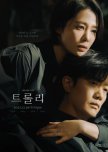
Its empathic. Powerful. Yet, beware: it is rather slow & actually not on the bright side of life
"Trolley" is a SBS production for South Korean TV first of all, even it is promptly running on Netflix, too. One could say that the KDrama is about a politician's wife, who is caught up in an emotionally draining past and overtaken by an extremely unpleasant present. One could say that it is about an ambitious politician with a promising career, who is in the middle of the national assembly election campaign and will give everything for it. One could say that it is about the classic moral trolley dilemma, which is running through the story like a key note – should one intervene in the unstoppable, catastrophic events and sacrifice one human life in the process, or let things take their course, the but then (in the case of the trolley dilemma) will claim several victims? With respect to each of these varying aspects, the story delivers suspense, depth and emotional intensity, enriched with complex details until the end.
"Trolley" is like a large patchwork quilt made up of many colorful, isolated, fateful pieces of the jigsaw puzzle that becomes a whole while increasing in suspense episode by episode. And this spectacular whole is what I particularly appreciate about this KDrama. Because the production is dedicated to a sensitive issue in South Korea society: the devaluation, harassment, oppression, contempt, discrediting, defamation, exploitation, sexualization of women and widespread physical violence against them.
The KDrama articulates a quiet howl calling for change. This howl, which has been rather mute for the longest time, wants a voice. This howl of pain wants to be heard. One voice should become many. Laws protecting women (and victims of abuse in general) would be all well and good. But even more so (and above all) there is a need for courageous role-models of women (and men) who lead the way. (Or for a start: KDramas and their e.g. female protagonists...) Role models are needed, who stand up for themselves, for their lives, for what happened to them, and for their rights as human beings. Tangible role models are needed embodying what lies at the heart of (these much-needed) laws: the non-debatable dignity inherent in every human being, regardless of gender, creed, birth, or ability. Paragraphs alone are not enough. They must be filled with life. With people who dare to actually venture out of the familiar swamp with their heads held high. And that's (for women) still easier said than done in South Korea 2023. "Trolley" embodies these circumstances in an impressive way. In fact, this is more than overdue. This TV production also places this message with some force and spreads it worldwide, too, so it cannot be overheard. Can it? May the message get through and encourage … women, young people, … and men too.
However, the spotlight is not directed at one or 'the' man as such, but at society as a whole, in which women structurally function (or supposed to function) well; in which they themselves participate in the premises - as mothers, as classmates, as part of a bullying, via public and Social media easy to manipulate crowd. The poisonous social thorn is so deeply rooted within women themselves: a systematically and consistently cultivated, inferior attitude towards their life. The the circumstances usually aren´t even seriously questioned because: that's the way it is… has been… (will be?)
Practically all of the women in this KDrama represent a self-esteem that has been deeply hurt and thus weakened as a result of private and public devaluation or even physical violence. They all somehow learned to live with it. They are battered, wounded and scarred, and they suffer from their feeling of inferiority that weakens them into old age. The worst thing about it: that they are still standing there alone, because nobody really can/wants to acknowledge their suffering and justified anger. Women have had to learn to live with the fact that there are no witnesses, no advocate, no encouragement, no attention, no consolation for them and their traumatic experience of harassment. No one is standing in their corner. The social message: You didn't deserve anything else. You´re to blame. 'Submissive, quiet, tame and silenced, everyone can do whatever they want.' Such is fate as a daughter. As an unwanted daughter. As the first daughter. As a daughter-in-law. As a wife. As a divorced woman. As an illegitimate mother. That something, which has remained deeply in these women, now shows impact, too: so that they either secretly and quietly devalue and question themselves, alternatively devalue others on their behalf, or let others devalue them on principle. This painful experience has not been redeemed to this day and should not be redeemed (from the social point of view of some). It is the ingrained yet invisible mark that South Korean society brands its women with. With "Trolley" it is out in the open. In multiple ways. Options for change are discussed, and the difficulties involved are also explored.
A strong portrait of society, cleverly prepared and seriously presented, yet in an entertaining manner. The KDrama meets a red-hot zeitgeist that calls for winds of change. The story courageously challenges the conservative, patriarchal attitude, which by nature denies women the right to be fully acknowledged human beings with the same rights. In the course of the last year, blood boiled high in South Korea after President Yoon declared 'structural sexism' being no longer existent in the Republic and wanted to abolish the Ministry for Equality and Family (or move it to other departments). In these times (see also the side note below), "Trolley" is a courageous and important production, because it tells a different story - that of devalued, sexualized, abused women in a self-satisfied man's world. Respect!
Its empathic. Powerful. Yet, beware: it is rather slow and actually not on the bright side of life.
---------------------------------------------------------------
SIDE NOTE: --- Always burning topical: violence against women in South Korea ---
If you compare the crime statistics in (i.e.) Germany and South Korea, South Korea is clearly the safer country. Seoul is arguably one of the safest cities in the world. But not for women...
Overall, violence in South Korea may be limited. But against women it is alarmingly widespread. Of the violent crimes recorded in South Korea, about 80 percent of the victims are women. In 2020, more than 58 incidents of sexual violence, including rape, were recorded among 100,000 residents in South Korea. (There were 12 in Germany for comparison). There have been newspaper reports of brutal femicides almost weekly in recent years. In a national survey conducted by the Ministry for Gender Equality and Family in the summer of 2021 (the ministry still existed then), 57.8 percent (!) of women stated that they felt threatened by misogynistic violence.
But the current political line is different. President Yoon stands for the values of the so-called "New Men's Solidarity". Behind this is a deeply patriarchal, conservative thinking that denies women to be full human beings with the same rights. Accordingly, the official line tends to go backwards: the penalties for false allegations of sexual assault are increased and the politicians rather argue with classic perpetrator-victim reversal: the women provoked the men by not doing what the men want them to do . Courts rarely judge in the interests of women. On the contrary. The outcome might be: victims of sexual violence are punished more severely than the perpetrators. Law against defamation of sex offenses is far stricter than that on sex offenses. It allows victims of sexual violence to be sentenced to up to 3 years in prison – even if it is proven that their publicly disclosed allegations are true. In the actual cases of sexual offenses, the verdicts against the perpetrators, however, are mostly merciful, with a mild sentence for crimes against women, as soon as there is one or the other weakening reason or an impeccable good reputation. Lax investigations and re-traumatizing behavior towards female victims in police and judicial authorities make matters worse.
All in all, it is very difficult for women to effectively defend themselves against the violence they might have experienced. Headwind blows from almost everywhere. Here we are again with the deeply patriarchal, conservative basic attitude of a society that denies women as a matter of course that they are full human beings with the same rights. This 'self-evidence' needs to be questioned and confronted. Resistance works best when women unite and at least start to stop this structural mutual devaluation among themselves. Speak, talk, share, cry, console... You don't need laws for that. Supporting one another, acknowledging injustice as such, comfort and compassion would be soothing ointments on the wounds of countless women that could heal a little bit better that way.


 9
9 37
37 15
15


















